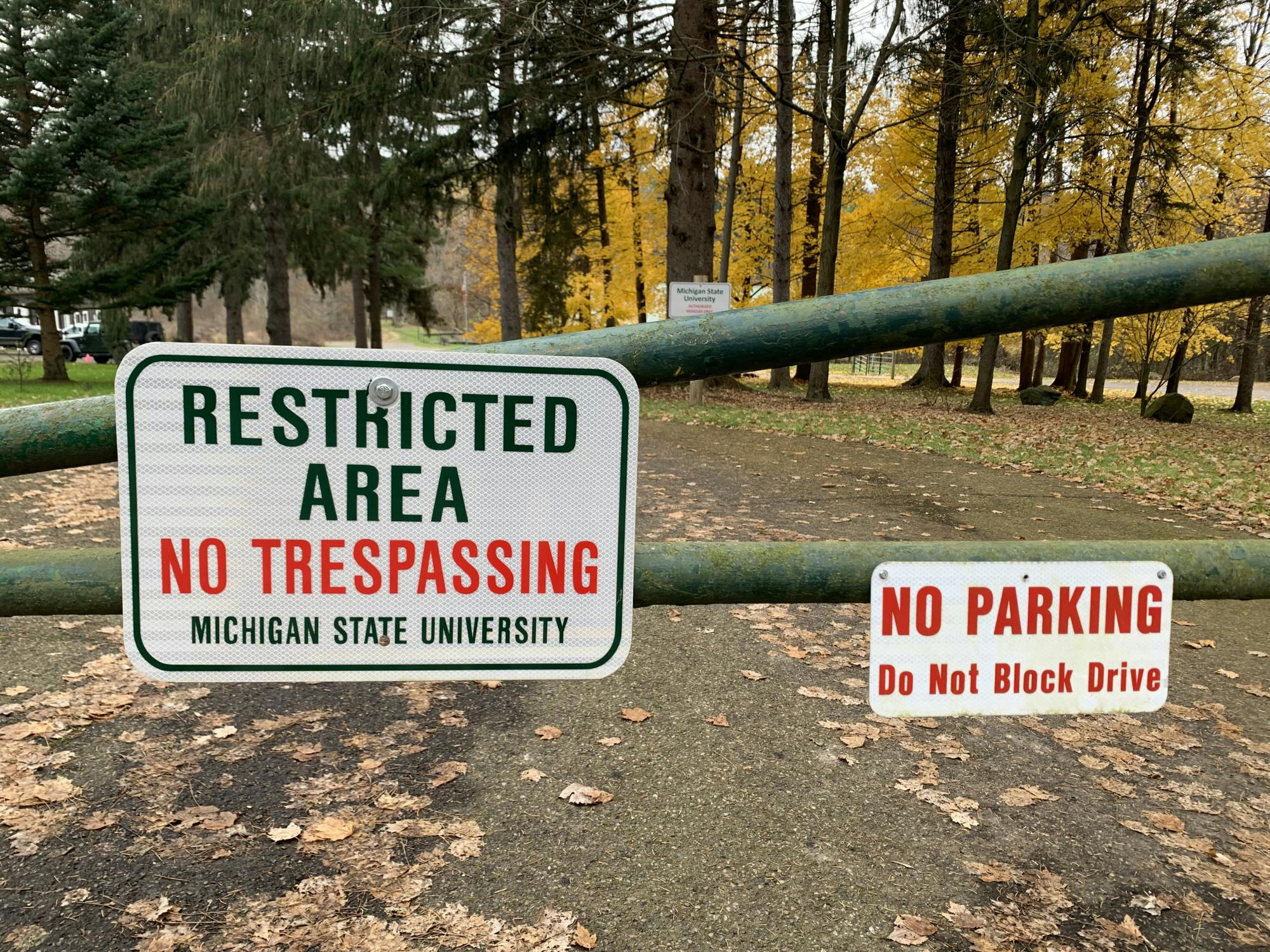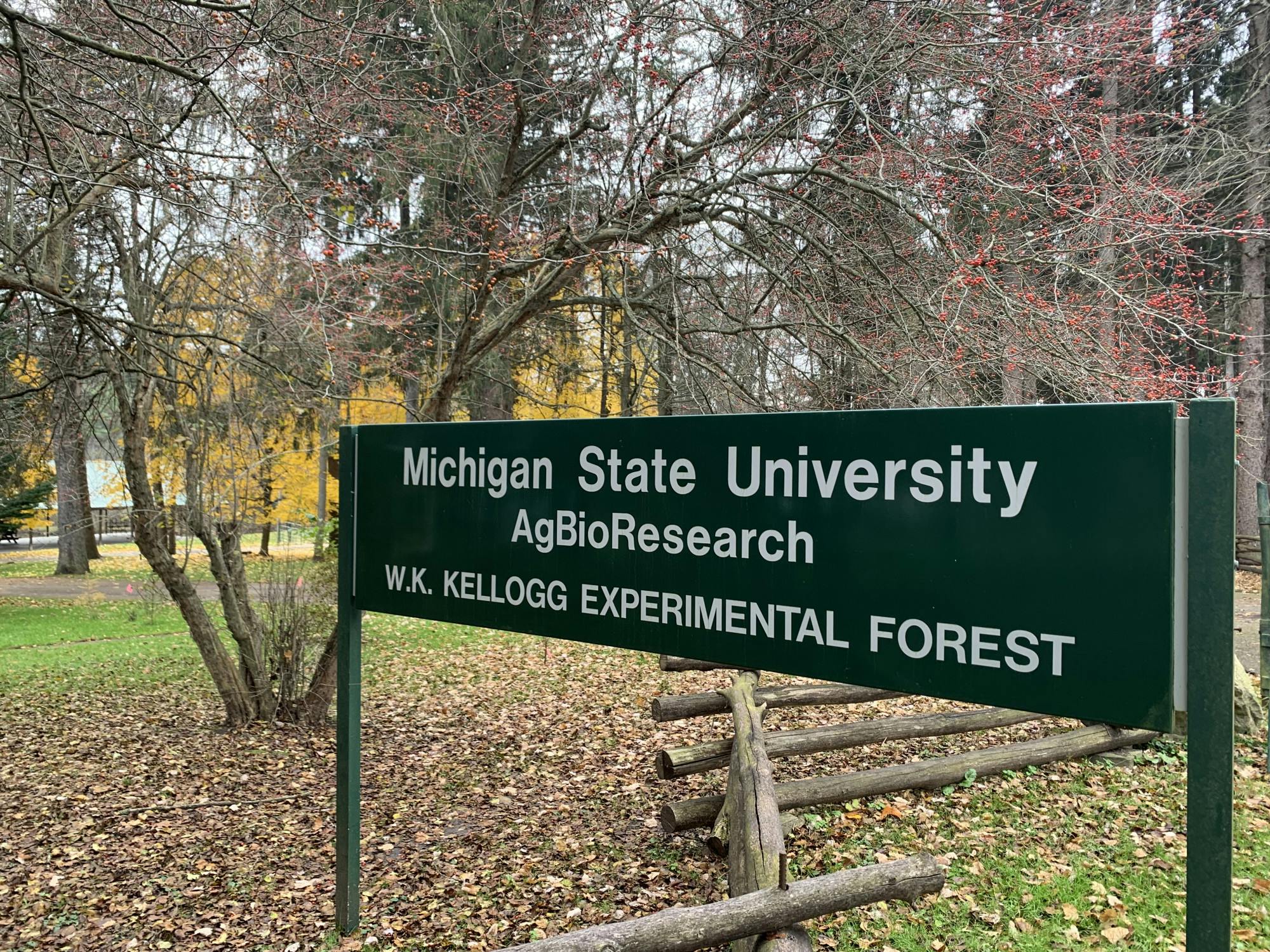Every Thanksgiving, Steve Patterson takes a walk in the W.K. Kellogg Experimental Forest.
It’s a reflective activity, and something he looks forward to doing with friends and family come November.

A sign outside W.K. Kellogg Experimental Forest stating that it is a restricted area on Nov. 21, 2021. This area was previously open to the public, but has been closed since March 2020.
Every Thanksgiving, Steve Patterson takes a walk in the W.K. Kellogg Experimental Forest.
It’s a reflective activity, and something he looks forward to doing with friends and family come November.
The forest, which is owned and maintained by Michigan State University, mainly serves as a research area for the Department of Forestry.

The 716-acre plot is located about 60 miles southwest of MSU’s main, East Lansing campus. Originally abandoned agricultural land, it now serves as a critical area for the department’s research into tree breeding, planting techniques and plantation management.
This year, though, Patterson is steering clear of the property. He no longer feels welcome.
“I won’t be going there this year,” Patterson said. “I’m not happy about it, that’s always been those holidays, let’s go take our walk before our meal. And that’s been taken away.”
Patterson’s change of heart, according to him, is the result of forest manager Kenneth Kettler’s and the Department of Forestry’s actions in recent years— most notably, shutting the public out from beloved areas of the land.
“It’s very special to me, I consider it a sanctuary,” Patterson said. “And what’s happened is there’s been a new manager that’s come in the last few years and things have really changed.”
Claims from Patterson and other forest fans are varied, but all include a more strict and restrictive environment in an area that was essentially free-reign for walkers, bicyclists and horsemen.
The main entrance, where MSU’s headquarters are located, has been gated and adorned with “No Trespassing” signs. A covered bridge that served as a picturesque landmark is now boarded and locked— preventing anyone from crossing over it. A bronze marker honoring Walt and Virginia Lemmien, who previously cared for the Kellogg Forest, is unavailable for viewing by the public.
Recently, Patterson created a petition in protest of the Kellogg Forest closings.
“Gates, fences, locks, boardings, signs and threats of arrest make it clear that the Forest Manager has the 'YOU ARE NOT WELCOME HERE' mat out for visitors,” the petition states.
The petition has 828 signatures at the time of publication.
The forest is a deeply sentimental piece of land to many locals— many of whom have gotten married, formed traditions and started their day within it for generations.
Longtime local resident Pamela Sager looks back fondly on the memories made in the Kellogg Forest.
“My husband and I were married there in 1983,” she said. “And it was beautiful. It was like a park.”
However, in recent years Pamela Sager and her husband have been barred from entering their marriage spot— as it is included in the research-restrictive portion of the forest. When they were granted special permission to drive through it on their 25th wedding anniversary, she said the area had lost much of its charm.
“I must say it was sadly overgrown, not pristine,” she said. “It was kind of pitiful not maintained to the standard it once was. Which was a real loss for the community.”
Support student media! Please consider donating to The State News and help fund the future of journalism.
Sager’s husband, Stan, is also a member of the Battle Creek Hunt Club — an organization that frequently rode the Kellogg Forest trails on horseback. According to him, Kettler barred the group from the property when he took control of the forest.
“We were kind of surprised. Like, ‘What was the problem that when we pass through?’” Stan Sager said. “We’ve never been where we tore up anything in there.”
According to Sager, Kettler told the group that they “messed up things” in the forest. Sager fervently denies this.
Kettler said the closings and barring from certain traffic were due to an increase in research projects throughout the forest. According to him, the changes are necessary to protect his team’s studies.
“I started here about five years ago, and prior to that there was not a ton of research occurring here for, I don’t know, maybe a decade or so,” Kettler said. “We’ve implemented a ton of management and new research since then, and that’s conflicted with people’s ability to recreate at some points.”
Additionally, a large-scale lumber sale of the forest began, coincidentally, at the beginning of the pandemic. According to Kettler, multiple visitors were venturing into restricted areas where the harvest was taking place, and putting themselves in harm’s way.
Kettler said the combination of safety concerns and COVID-19 led to the large-scale closing of certain areas of the forest in March 2020.
“We just had visitors entering those areas all day long, and creating really unsafe conditions for themselves and the logging contractors,” Kettler said. “And that’s when we closed the gates ultimately."
Kettler cites multiple incidents of destructive behavior near these research sites as motivation as well. According to him, vandalism, trespassing and theft have occurred on a regular basis.
“More than a few of those (sites) have been impacted by vandalism or trespassing into those areas, and have been disturbed in some way,” Kettler said. “So we’re really trying to continue providing that access, but re-message to the community that this is a research facility.”
Michigan State University Police Department public information officer Chris Rozman said that his department is aware of such crimes occurring on the property, but could not go into detail at time of publication.
Department of Forestry professor Richard Kobe said that the university has attempted to give the public alternate options for enjoying the land without interfering with research. He pointed to the new gravel parking lot recently constructed on the west side of the forest as proof of this initiative.
“They have access to all the trails as previously,” Kobe said. “But I think that the old parking lot, there’s some people who are very attached to entering the trails from that location.”
Kettler emphasized that MSU has no responsibility to provide public access to the land. Technically, it is privately owned.
“We don’t have any obligation to provide public access in any regard,” Kettler said. “And we don’t have legit resources to really focus on that. It’s more of a courtesy, and something that we’ve been doing for a long time.”